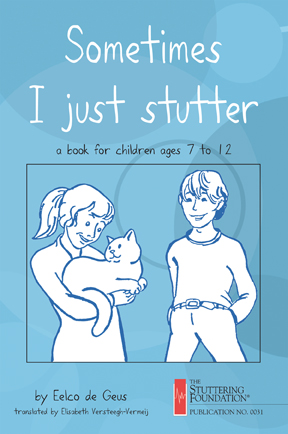By Mary Mejia
 Addressing students about their stuttering is one of the hardest tasks for me to do. Maybe it is because I am new to the field. I do not have the perfect words to say or a script to memorize. I’ve learned that you have to approach every student differently. That goes for any child – even those who do not stutter. Nobody is the same. I love that!
Addressing students about their stuttering is one of the hardest tasks for me to do. Maybe it is because I am new to the field. I do not have the perfect words to say or a script to memorize. I’ve learned that you have to approach every student differently. That goes for any child – even those who do not stutter. Nobody is the same. I love that!I came across this children’s book, Sometimes I Just Stutter, by Eelco de Geus, on the Stuttering Foundation’s website and I decided to read this with my students who stutter. I began the session by asking if they knew why they came to speech. Some knew and some did not. Those who did not know put me in an awkward situation. I could not just say, “Well you see me because you stutter.” Or could I?
Instead, I asked, “Well, do you know what it means when someone stutters?” I’ve only had “yes” responses thus far. “Do you sometimes stutter?” That’s when I get mixed answers of “yes,” “no,” or “I used to.” That’s what makes me uneasy about the subject of stuttering.
When children tell me they do not stutter and they do stutter, I am unsure how to respond. Thankfully, I came across this book which answers and explains questions about stuttering in simple terms. Instead of trying to find the most sensitive words to say to my students and sounding unsure or come across as unsympathetic, I decided to read this book and discuss it with my students.
They opened up about their own stuttering. They often say, “Oh yeah, I do that” or “That happens to me.”
“I used to get told I was ugly when I stuttered,” one of my students told me.
This book made my students and me comfortable to speak about stuttering. It allowed me to understand their thought process when speaking. It allowed them to realize that they do stutter sometimes and that it is OK.
Sometimes students will say they understand something, and in actuality they have no clue. Some of my students said they knew what stuttering meant, but in actuality they didn’t. I remember I used to do the same thing when I was child. Actually, I’m still guilty of doing so. Luckily, I have a smart phone and can Google things right away!
I enjoyed reading the personal stories that children wrote in the book. That lets the students know they are not the only ones who stutter and have concerns about their stuttering. Often times, children choose to stay silent because they are so ashamed of their stuttering.
If you know anybody who stutters, the best thing to do is make them feel comfortable when speaking to you. I recommend reading this book and sharing it with others. The book also has personal letters that you can give to brothers and sisters, parents, grandparents, uncles and aunts, and teachers.
Something else I learned from reading this book:
Myth: It helps to tell a person to “take a deep breath before talking,” or “think about what you want to say first.”
Reality: This advice only makes a person more self-conscious, making the stuttering worse. More helpful responses include listening patiently and modeling slow and clear speech yourself.
Courtesy of www.kdhnews.com. Used with permission.
From the 2014 Summer Newsletter






 Podcast
Podcast Sign Up
Sign Up Virtual Learning
Virtual Learning Online CEUs
Online CEUs Streaming Video Library
Streaming Video Library